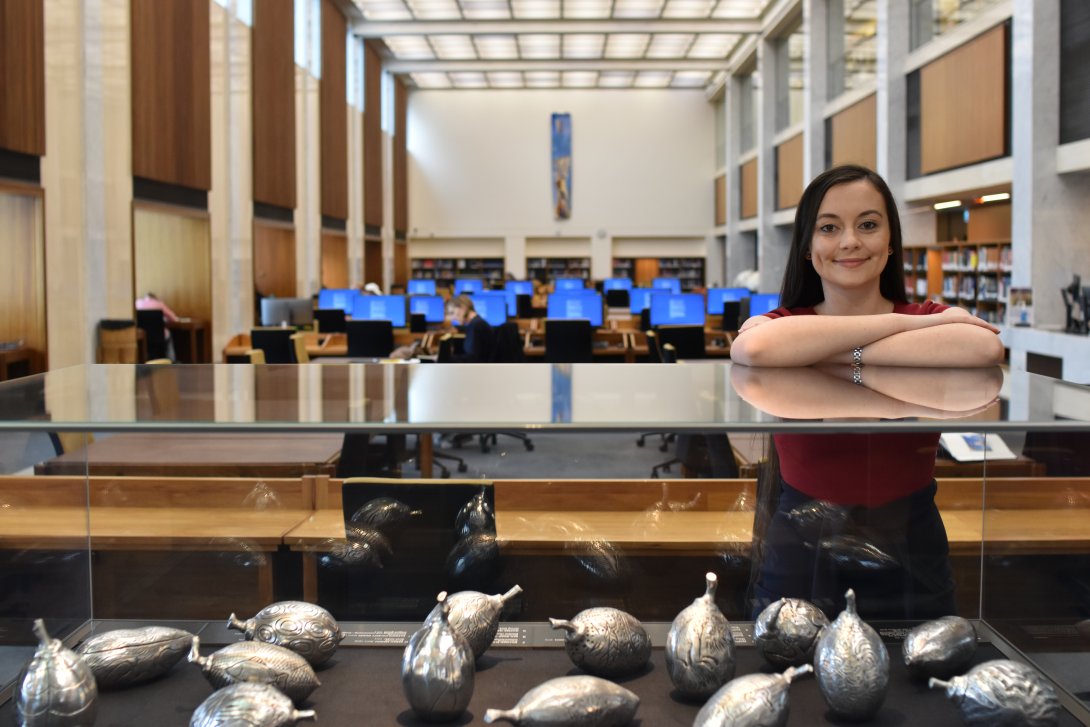Due to scheduled maintenance, the National Library’s online services will be unavailable between 8pm on Saturday 7 December and 11am on Sunday 8 December (AEDT). Find out more.
The National Library has a range of Scholarships available to the next generation of Australian scholars.
Madeleine Pugin was a recipient of one of the National Library of Australia Scholarships in 2022. Her Nangaypa Rirraliny Scholarship was funded by Emeritus Professor Janice Reid AC.
During her time at the Library, Madeleine’s research focused on the Library’s resources related to the Kombumerri people, Yugumbir/Yugambeh language group, and Bundjalung nation.

Q&A with Madeleine Pugin
Why did you want to research at the National Library?
The National Library appealed to me for two main reasons. The Library has large collections and items I had not been able to access elsewhere throughout my research. It also holds many rare resources. This meant I could not only read them, but do so in one place at one time, which was very convenient. Access to full office facilities and a personal workstation provided the perfect work environment, resulting in a very productive six week stay.
How did your time at the National Library help you to advance your research?
I was able to advance my research, particularly having access to archival material for my case study on my people, the Kombumerri. I was able to read government reports, dictionaries on the Bundjalung, Ngarahngwal, and Yugumbir/Yugambeh languages, maps, and other important ephemeral sources. I read many books from the Main Reading Room, used sources from the Special Collections Reading Room (including books from the 1800s), accessed Ancestry Library, and spent considerable time exploring Trove. The resources far exceeded my expectations.
What do you hope people learn from your project? What did you discover that you want to share?
I don’t think Australians know enough about Aboriginal and Torres Strait Islander peoples. Our histories and cultures are incredibly diverse and complex, and we identify in different ways. The Library holds many sources that prove this.
My community, the Kombumerri, has cared for what is now known as the Gold Coast for thousands of years. Thanks to our ancestors, we maintained our connections to the region and have never left. The Kombumerri are the Traditional Owners of the Gold Coast, surrounded by many other groups including: the Bullongin (Coomera), Gugingin (Logan), Mununjali (Beaudesert) and the Migunberri (Christmas Creek). Some of these groups are no longer here to speak for themselves and their Country.
It is also important for Indigenous and non-Indigenous peoples to know that the United Nations Declaration on the Rights of Indigenous Peoples (UNDRIP) is an important Indigenous human rights document. This document can be referred to at all levels of government and in all settings, whether that be health, education, economics and business, and environmental protection, to name a few.
Why would you recommend the National Library of Australia Scholarship to others?
I strongly encourage other Indigenous peoples to apply for a National Library of Australia Scholarship. As the Library’s collections are extensive and unique, I am confident you will find useful material you didn’t even know you were looking for. The staff, including the Indigenous Engagement section, are more than happy to assist with any queries and help to provide a welcoming, supportive, and culturally safe environment. In-person access to the Library’s Bookshop is also a bonus.
More information
National Library of Australia Scholarships (formerly known as Summer Scholarships) are offered to researchers from across Australia undertaking PhD studies.
Successful recipients have access to material from the Library’s collections to further their postgraduate research. During their six-week residency, National Library of Australia Scholars also have access to full office facilities including a personal workstation.
Read more about the National Library’s Fellowship and Scholarship programs.
Please note: The National Library is undertaking a review of its Fellowships and Scholarships program to ensure it meets the needs of researchers, PhD students and creators. This review may result in changes to some of the opportunities offered beyond 2024.